After resisting an acquisition from Facebook, Snapchat’s CEO, Evan Spiegel bought every employee “The Art of War.”
“The Art of War” is a book written around 500 BCE in ancient China.
The author, Sun Tzu was a military general, strategist, and philosopher.
His book has influenced many military operations and conquests over the years.
Why would a CEO of a social media startup give a book about war to each of his employees?
Gaining the attention of anyone online is like a battle.
You’re competing against many other businesses and individuals. They all demand the attention of the same person you want.
Search engines are one of the most reliable channels to drive web users to your website.
To rank high in search engines, you need to understand SEO (search engine optimization).
Your competitors want to rank number one for the same keywords you want.
They are applying the same SEO tactics you know.
How do you ensure that you continue to win the SEO battle and get more targeted visitors from search engines?
There are eight brilliant ways to stay ahead of the competition in the battle to claim the top spots in search engines.
1. Monitor trends
Keywords are the most important elements of search.
When a web user enters a phrase into the search box on Google, it returns relevant and useful results to the searcher.
You want your website to show up first for a phrase that is related to your business.
Every few years, they tend to be a rise in new keywords or phrases across most niches or industries.
Old keywords lose some interest among web users. New keywords emerge.
Google Trends is one of the potent tools digital marketers overlook.
The tool will tell you if a topic or phrase is losing or gaining interest online.
Create a lot of high-quality blog posts that target new, emerging keywords, and you’ll quickly establish your authority for those phrases in Google before your competitors do.
By the time your competitors are fully aware of these new keywords, they’ll be playing catch-up.
Search users will have recognized your website as an authority in that niche.
2. Fight link decay
The term “link decay” is not new in the SEO world.
As you probably know, links are a big part of search engine algorithms.
Therefore, link decay has been part of the search algorithms for a long time now. Perhaps, since their inception.
Link decay means your backlinks are losing value as time passes by.
For example, a backlink your site got from a high authority site ten years ago is not as valuable now as it was back then.
If you gained 300 backlinks three years ago and stopped building links, and a competitor got 100 links from established sites in the past year, they have a higher chance of surpassing you in search engine results.
Because they have new backlinks.
Search engines will think that if your competitors are getting a lot of backlinks than you right now, it means people love what they are doing.
Another type of link decay is when the pages you got backlinks from changed content and your links were removed.
Maybe the domain name expired.
Your backlinks are de-indexed. You’ve lost those links.
I don’t believe in the magical power of old links or links from old pages.
I don’t believe that links created five years ago are more valuable than links created a month ago.
If the page the link is coming from isn’t being updated on a regular basis, it loses its relevance in search engines.
Okay, let me give you an example.
Steve Pavlina, one of the most popular personal development bloggers, got a backlink from Lifehacker.com in 2006.
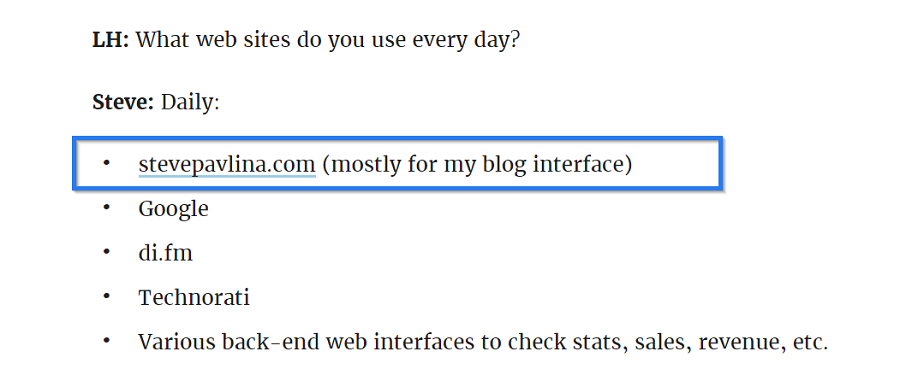
A link earned over a decade ago can’t be as powerful if your competitors are getting links from authority sites regularly.
So, fight link decay.
How do you do that?
Publish evergreen content that will continue to earn backlinks for many years to come. You should also keep updating your pages.
It makes your content the perfect choice for website owners or bloggers who link out.
An article published by Cyrus Shepard on Moz titled “How to Rank: 25 Step Master SEO Blueprint,” is a perfect example of a blog post that will continue to earn links for years to come.
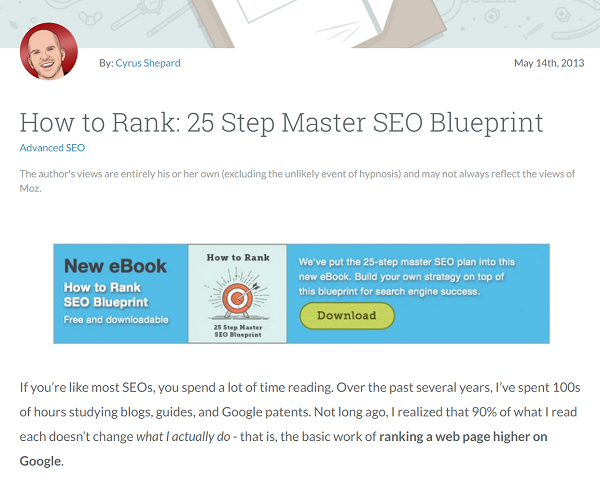
The article was published in May 2013, and it’s still relevant and useful today.
3. Strive for link diversity
SEO was simple some years ago. The more links you have, the higher you rank.
Today, search engines look deeper into your backlinks. They analyze where they come from, and whether they matter to web users.
Your site should have different kinds of backlinks coming from various sites.
Here are some of the common ways to get links
- Guest blogging
- Press releases
- Blog commenting
- Infographics publishing
- Footer backlinks
- Business directories
- Bookmarking sites
- Social media profiles
And many others.
When you gain most of your backlinks through one particular link building method, it puts your search engine rankings at risk.
No link building tactic should make up 40% of your overall links.
To be on the safe side, I recommend 10%.
Spread your backlinks across various link building tactics.
By doing that, you’re diversifying your link profile.
Your link profile will appear natural and good in the eyes of search engines’ bots.
For example, by heavily relying on guest blogging to get most of your backlinks, you’re at risk of getting hit by a search engine penalty when they decide to stop valuing links from guest posts.
Because most of your backlinks come from guest posts, it’ll take you some time to recover from the penalty.
Instead of waiting for your site to get hit by a search penalty, you should start diversifying your backlinks now.
Doing that will help you have a better link profile and enjoy a strong presence in search engines.
4. Foresee more competition
If you’re in a competitive niche, it’s probably because many people are making good money there.
And if you’re in a low competition niche, you should expect competitors to increase because more people will think it’s easier to build a business there than crowded niches.
If competition is high in a particular niche, you’ll find it harder to rank for top keywords in that niche.
For example, as an SEO consultant, ranking for the keyword “SEO consultant” is tough because a lot of people do what I do.
They want to rank for that keyword too.
You’ll have to work harder and smarter than competitors if you want to gain a lot of traffic from search engines.
It doesn’t matter whether competition is high or not.
So, instead of doing better than your current competitors, you should expect new upstarts who are ready to do more to overtake you in search engines.
You should out-think, out-work, and out-brand your competitors.
By out-thinking the competition, you create new exciting content ideas that’ll interest search engine users.
By out-working the competition, you create more content than anyone in your niche.
For example, when Pete Cashmore started Mashable, he was writing seven blog posts per day. That is more than what most of his competitors were publishing in a week.
By out-branding the competition, you invest a lot of time into brand-building and educational content. Your goal is to get people talking about your brand everywhere on the web.
For a high competition keyword like “compare credit cards,” you’ll expect banks, financial institutions, and financial press to rank #1 for the keyword.
Instead, it’s a niche site, comparethemarket.com that is ranking in the number one position for this keyword that receives a huge number of searches per month.
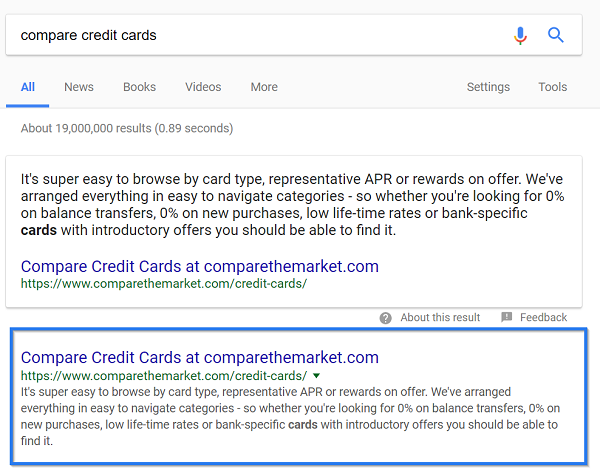
Create a lot of blog posts that target long-tail keywords.
Long tail keywords are phrases that contain 4 or more words that are related to your business.
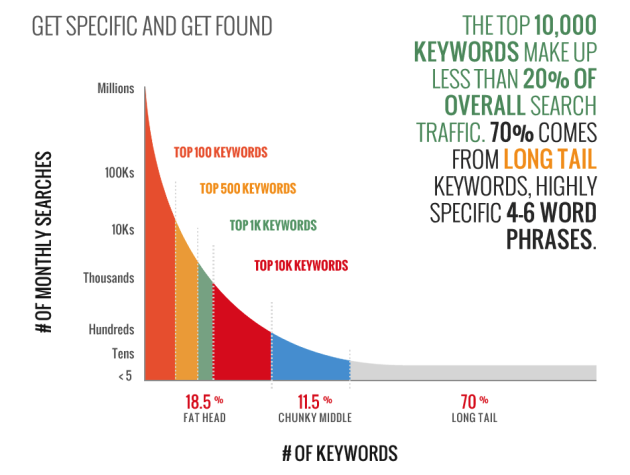
Don’t wait for new competitors to knock you out.
Out-think, out-work, and out-brand them before they appear.
5. Get quick wins by ranking for easy terms
Every niche has some easy keywords anyone with a low authority domain can rank for.
I use Keyword Explorer by Ahrefs to determine the ranking difficulty level of a keyword.
Ahrefs uses a scale of 1 – 100 to determine how difficult a keyword is.
Any keyword below 30 is an easy keyword.
For example, the keyword “small business marketing consultant” has a difficulty of 26.

If you take a closer look at the sentence below the difficulty score, you’ll see Ahrefs suggesting that I only need backlinks from 30 sites to rank in the top 10 for this keyword.
It’s easy to rank for keywords like this because your competitors aren’t focusing on them.
Perhaps, they haven’t built many backlinks to pages that target those easy keywords.
Ranking for keywords that are easy help you establish some level of authority and credibility in search users.
For example, MedCognition, a medical and technology startup may avoid trying to rank for tough health and medical keywords, and instead focus on queries that receive low searches on Google.
When search users see you as an authority and credible expert, they’ll spread the word about your site. That may drive more backlinks to your site, which you need to rank even higher in search engines.
6. Upgrade your SEO strategy
When you’ve used the same SEO tactic for a long period of time, and gain the same type and quality of links, your organic search traffic may stop growing.
An SEO strategy could become less effective over time.
Perhaps, because your competitors are using the same approach.
Or, the strategy has become too common and no longer works.
You’ll have to upgrade your SEO strategy to start receiving better and more traffic from search engines.
For example, when long-form content became an SEO strategy, marketers who first used it saw big boosts in their organic search traffic.
In a Forbes‘s, R.L. Adams writes that he “ranks number one for so many of the most competitive searches, and almost all of those articles are over 2,000 words.”
Today, writing long-form content as an SEO tactic isn’t as effective as before.
So many people are now creating long-form content to receive more visitors from search engines.
Neil Patel wrote that Kissmetrics generated 2,512,596 visitors and 41,000 backlinks within two years, using infographics.
Kissmetrics traffic from search engines increased as a result.
Today, there are too many infographics on the web, and the tactic is less useful for link building.
Upgrading your SEO strategy means finding and using new tactics that boost search traffic.
7. Don’t sacrifice quality and quantity
Quality and quantity are both vital to winning the SEO battle.
Search engines rarely reward inactive sites.
Each blog post you publish is an opportunity for people to see your site in search engines.
The more blog posts you publish, the more visits you’ll receive from Google and Bing.
A study by HubSpot found that companies that published 16+ blog posts per month got almost 3.5X more traffic than companies that published between 0 – 4 monthly posts.
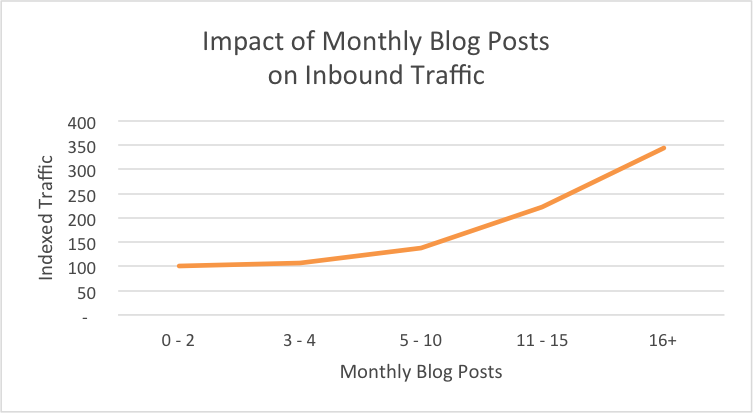
The quality of your posts is also important.
Publishing low-quality articles won’t help you win in search engines.
Higher quality content will help your site rank for many keywords.
Quality content is not easy to create.
If it’s easy, everyone will be doing it.
For example, I spent 10 hours creating this article.
When you publish a lot of high-quality articles, search engines will have no choice but to rank your website high for competitive keywords.
8. Branch out into related niches
If you publish a lot of high-quality articles, you’ll soon exhaust topics and keywords in your niche.
Instead of writing about the same topics, branch out into related niches in your industry.
For example, if you’ve exhausted the bodybuilding niche, you can start creating content about nutrition.
Bodybuilding and nutrition are connected.
After exhausting topics and keywords in the nutrition niche, you could branch into men’s or women’s health.
Even if you’re a local business, you should create content that targets topics related to your profession.
As you continue to venture into related niches, search engines will see you as an authority.
